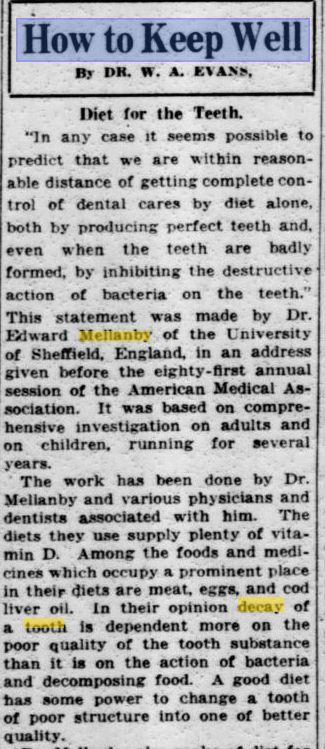Well, first off, let me say that I have an enormous respect for the art of dentistry. I use a regular dentist. But, if I ever noticed a dental problem, I might try some non-invasive alternative approaches before opting for surgery. Dentists and medical doctors receive relatively little training in nutrition. Much of their exposure to nutrition comes from studies funded by corporate interests that attempt to downplay nutrition — which cannot be patented. Even educational institutions and their professors are often heavily influenced by corporate funding.
The nutritional approach is based on research from the 1930s. The research from the 30s has been out of print for decades — made accessible again only through recent republishing by Internet-based archivists. Here is an excerpt from
Nutrition and Disease (1934), by
Sir Edward Mellanby GBE, KCB, MD, FRCP, FRS — a renowned medical doctor who was with the University of Sheffield, England. He's
the doctor who discovered Vitamin D, which he was later knighted for, in 1937. Mellanby was no snake oil salesman.
[align=center]

[/align]
Notice the title at the top of the page...
"Healing" of Dental Caries in Human Teeth by Diet.
And the accompanying text to the figure reads:
The hardening of carious areas that takes place in the teeth of children fed on diets of high calcifying value indicates the arrest of the active process and may result in “healing”? of the infected area. As might be surmised, this phenomenon is accompanied by a laying down of a thick barrier of well-formed secondary denture. Illustrations of this healing process can be seen in Figs. 21 (b), (c) and (d). Summing up these results it will be clear that the clinical deductions made on the basis of the animal experiments have been justified, and that it is now known how to diminish the spread of caries and even to stop the active carious process in many affected teeth.
Source:
http://www.thedentalessentials.com/v/Do ... 201934.pdf
You can download a summary of the research here:
http://www.thedentalessentials.com/v/Do ... 201934.pdf
Sir Mellanby, spoke before the 81st annual session of the American Medical Association, saying...
[align=center]

[/align]
Of course, that wasn't going to fly with dentists who depend on surgical procedures for income and corporations who want to sell tooth decay prevention products. So, corporations came along and funded major studies on how fluoride toothpaste, surgical devices and manufactured products can prevent tooth decay. Dentists and corporations lined up to support revenue-producing surgical solutions and did everything in their power to disprove simple, unprofitable dietary solutions.
Despite the fact that the well-respected Mellanby discovered perhaps the most important nutrient on the face of the planet, most of his research has been buried to save the dental industry. Understandably, the science that backs today's dental procedures is designed to generate revenue. This is why nutrition is barely taught in medical school and dental school — it's unprofitable.
As the years went on, some dentists rediscovered nutrition as having some effect on tooth decay. For instance, here's a reprinted article from
Prevention Magazine (October, 1978).
http://mizar5.com/heal.htm
Not surprisingly, the dentist in the
Prevention article seems completely unaware of Mellanby's successful nutritional recommendations.
..But of course, nutritional approaches don't pay the bills for dentists, so Sir Mellanby's work was shunned and nutrition was ignored.
Again... I have a huge respect for dentists and their surgical skills. I just think that not everyone needs surgery to solve their dental issues...and dentists can't afford to explore unprofitable nutritional solutions.
Nothing I say should be construed as advice or expertise. I am only sharing opinions which may or may not be applicable in any given case.


 [/align]
[/align]